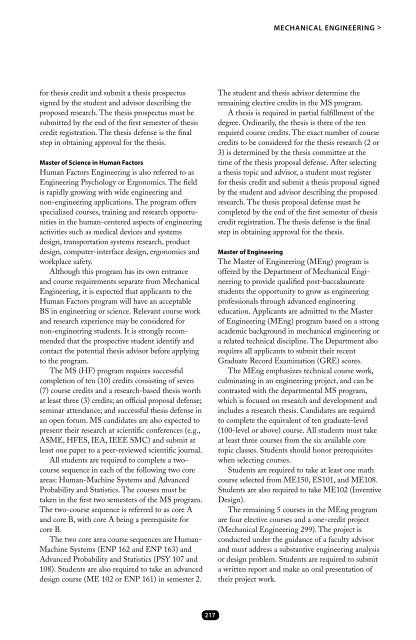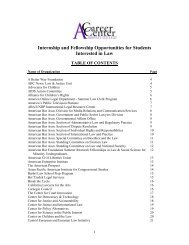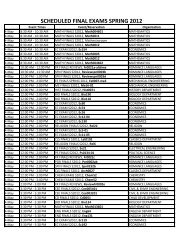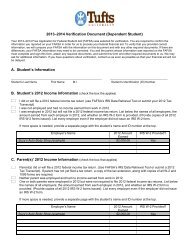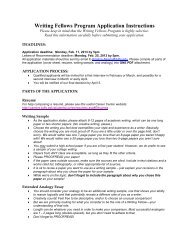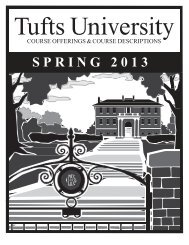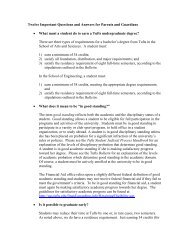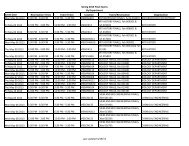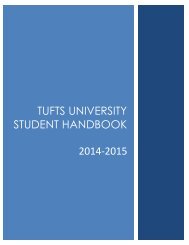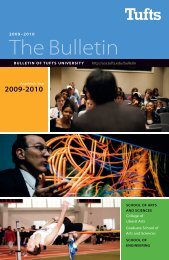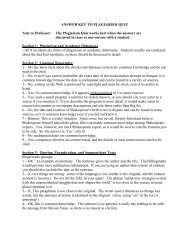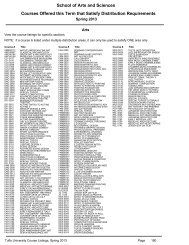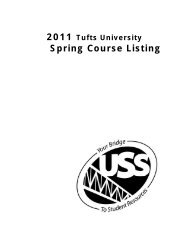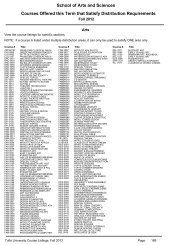2013â2014 The Bulletin - USS at Tufts - Tufts University
2013â2014 The Bulletin - USS at Tufts - Tufts University
2013â2014 The Bulletin - USS at Tufts - Tufts University
You also want an ePaper? Increase the reach of your titles
YUMPU automatically turns print PDFs into web optimized ePapers that Google loves.
Mechanical Engineering ><br />
for thesis credit and submit a thesis prospectus<br />
signed by the student and advisor describing the<br />
proposed research. <strong>The</strong> thesis prospectus must be<br />
submitted by the end of the first semester of thesis<br />
credit registr<strong>at</strong>ion. <strong>The</strong> thesis defense is the final<br />
step in obtaining approval for the thesis.<br />
Master of Science in Human Factors<br />
Human Factors Engineering is also referred to as<br />
Engineering Psychology or Ergonomics. <strong>The</strong> field<br />
is rapidly growing with wide engineering and<br />
non-engineering applic<strong>at</strong>ions. <strong>The</strong> program offers<br />
specialized courses, training and research opportunities<br />
in the human-centered aspects of engineering<br />
activities such as medical devices and systems<br />
design, transport<strong>at</strong>ion systems research, product<br />
design, computer-interface design, ergonomics and<br />
workplace safety.<br />
Although this program has its own entrance<br />
and course requirements separ<strong>at</strong>e from Mechanical<br />
Engineering, it is expected th<strong>at</strong> applicants to the<br />
Human Factors program will have an acceptable<br />
BS in engineering or science. Relevant course work<br />
and research experience may be considered for<br />
non-engineering students. It is strongly recommended<br />
th<strong>at</strong> the prospective student identify and<br />
contact the potential thesis advisor before applying<br />
to the program.<br />
<strong>The</strong> MS (HF) program requires successful<br />
completion of ten (10) credits consisting of seven<br />
(7) course credits and a research-based thesis worth<br />
<strong>at</strong> least three (3) credits; an official proposal defense;<br />
seminar <strong>at</strong>tendance; and successful thesis defense in<br />
an open forum. MS candid<strong>at</strong>es are also expected to<br />
present their research <strong>at</strong> scientific conferences (e.g.,<br />
ASME, HFES, IEA, IEEE SMC) and submit <strong>at</strong><br />
least one paper to a peer-reviewed scientific journal.<br />
All students are required to complete a twocourse<br />
sequence in each of the following two core<br />
areas: Human-Machine Systems and Advanced<br />
Probability and St<strong>at</strong>istics. <strong>The</strong> courses must be<br />
taken in the first two semesters of the MS program.<br />
<strong>The</strong> two-course sequence is referred to as core A<br />
and core B, with core A being a prerequisite for<br />
core B.<br />
<strong>The</strong> two core area course sequences are Human-<br />
Machine Systems (ENP 162 and ENP 163) and<br />
Advanced Probability and St<strong>at</strong>istics (PSY 107 and<br />
108). Students are also required to take an advanced<br />
design course (ME 102 or ENP 161) in semester 2.<br />
<strong>The</strong> student and thesis advisor determine the<br />
remaining elective credits in the MS program.<br />
A thesis is required in partial fulfillment of the<br />
degree. Ordinarily, the thesis is three of the ten<br />
required course credits. <strong>The</strong> exact number of course<br />
credits to be considered for the thesis research (2 or<br />
3) is determined by the thesis committee <strong>at</strong> the<br />
time of the thesis proposal defense. After selecting<br />
a thesis topic and advisor, a student must register<br />
for thesis credit and submit a thesis proposal signed<br />
by the student and advisor describing the proposed<br />
research. <strong>The</strong> thesis proposal defense must be<br />
completed by the end of the first semester of thesis<br />
credit registr<strong>at</strong>ion. <strong>The</strong> thesis defense is the final<br />
step in obtaining approval for the thesis.<br />
Master of Engineering<br />
<strong>The</strong> Master of Engineering (MEng) program is<br />
offered by the Department of Mechanical Engineering<br />
to provide qualified post-baccalaure<strong>at</strong>e<br />
students the opportunity to grow as engineering<br />
professionals through advanced engineering<br />
educ<strong>at</strong>ion. Applicants are admitted to the Master<br />
of Engineering (MEng) program based on a strong<br />
academic background in mechanical engineering or<br />
a rel<strong>at</strong>ed technical discipline. <strong>The</strong> Department also<br />
requires all applicants to submit their recent<br />
Gradu<strong>at</strong>e Record Examin<strong>at</strong>ion (GRE) scores.<br />
<strong>The</strong> MEng emphasizes technical course work,<br />
culmin<strong>at</strong>ing in an engineering project, and can be<br />
contrasted with the departmental MS program,<br />
which is focused on research and development and<br />
includes a research thesis. Candid<strong>at</strong>es are required<br />
to complete the equivalent of ten gradu<strong>at</strong>e-level<br />
(100-level or above) course. All students must take<br />
<strong>at</strong> least three courses from the six available core<br />
topic classes. Students should honor prerequisites<br />
when selecting courses.<br />
Students are required to take <strong>at</strong> least one m<strong>at</strong>h<br />
course selected from ME150, ES101, and ME108.<br />
Students are also required to take ME102 (Inventive<br />
Design).<br />
<strong>The</strong> remaining 5 courses in the MEng program<br />
are four elective courses and a one-credit project<br />
(Mechanical Engineering 299). <strong>The</strong> project is<br />
conducted under the guidance of a faculty advisor<br />
and must address a substantive engineering analysis<br />
or design problem. Students are required to submit<br />
a written report and make an oral present<strong>at</strong>ion of<br />
their project work.<br />
217


